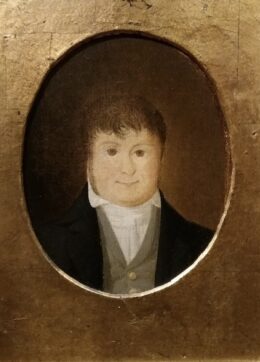
Printed
7 pages
Author(s)
Le Marchand de picarlats
Le Marchand de picarlats (The “picarlats” Merchant) is one of the oldest plays of the repertoire for Guignol, generally attributed to Laurent Mourguet himself. “Picarlats” is a word from Lyon that describes bundles of sticks used to light a fire. It was published in the second collection assembled by Jean-Baptiste Onofrio (Théâtre lyonnais de Guignol, Lyon, N. Scheuring, 1870). The Musée des Arts de la Marionnette (Puppetry Museum) - Musée Gadagne in Lyon keeps a manuscript of the play, which belonged to Victor-Napoléon Vuillerme-Dunant before it was acquired by the Rhône Prefecture on the 4th of January 1853, with several other manuscripts written later in the century.
Here, we are concerned with the most authentic version of the play, that is, the handwritten version of Vuillerme-Dunant’s play transcribed by Paul Fournel. The version of the text published by Onofrio, which can be accessed online (see the link below), ends with Guignol’s decision to invite everyone to the restaurant. Vuillerme-Dunant’s manuscript adds the scenes with the Apothicaire (Apothecary) and the Marchande (Female Merchant).
The play was performed in Paris under the title Le Marchand de cotrets, in the Théâtre Guignol opened by Laurent Josserand and Vuillerme-Dunant in a café of the Rue Popincourt. The newspaper Le Soleil gave a review of the play in the issue published on June 7, 1866.
The trickster is tricked
Guignol tries to sell a bundle of little sticks carried by his donkey. The barber Pommadin tries to negotiate the price, but Guignol refuses. Pommadin ends the deal and pays the price required by Guignol, but he requests everything that the donkey carries. Guignol agrees, but Pommadin takes the stick that was holding everything together. Guignol complains to the burgomaster, but he sides with Pommadin. Guignol goes to Pommadin’s barber shop and asks for him and one of his friends to be shaved, reassuring Pommadin that he will pay for both of them in advance. Pommadin takes the money, and Guignol comes back with his donkey and forces Pommadin to shave it. The burgomaster is called again, but this time, he sides with Guignol. Pommadin wants the donkey out of his shop and thus has to reimburse and compensate Guignol. An Apothicaire (Apothecary) sells Guignol a remedy that will make his donkey obedient. A Marchande (Female Merchant), Marie, complains to Guignol that the donkey destroyed her crystal and porcelain shop, and they argue. Guignol and Niafron run away to go and have lunch together out of the city.
Other titles
Publications and translations
Le Marchand de picarlats, in Paul Fournel, L'Histoire véritable de Guignol. Lyon: Fédérop, 1978.
Le Marchand de picarlats, in Paul Fournel, Guignol - Les Mourguet. Paris: Seuil, 1995.
